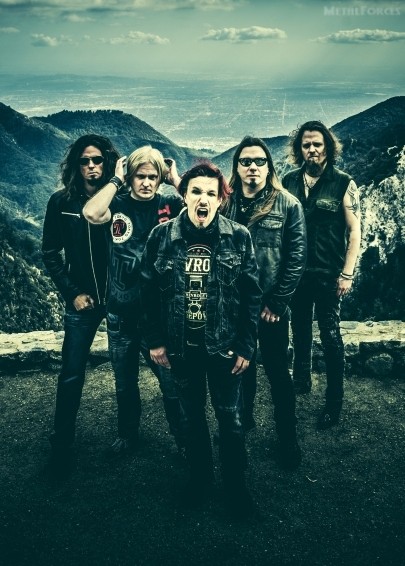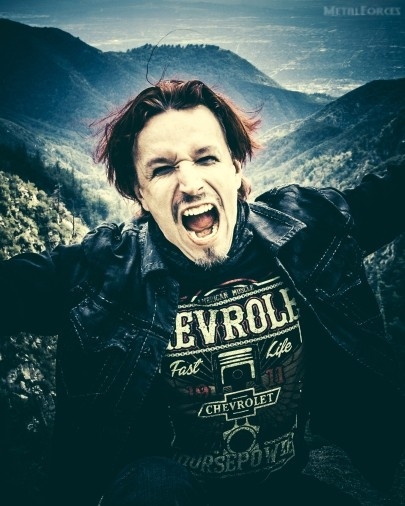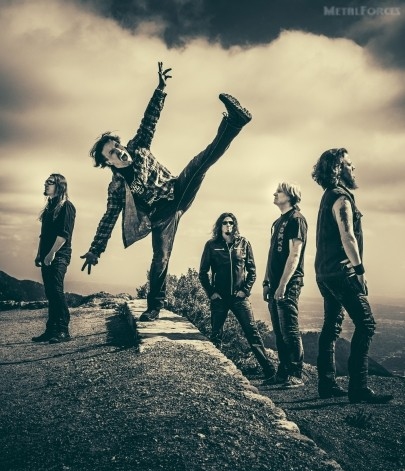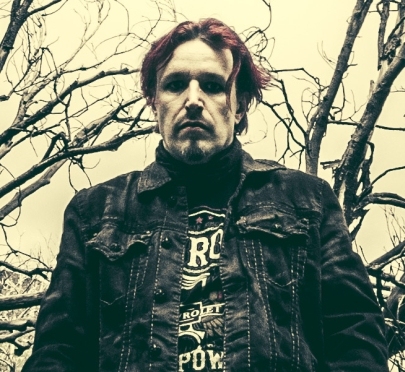

|
Nations have to collectively agree on measures, but having said nations agree on impactful enough measures is notoriously difficult. “We need to respect this planet,” Tony submits. “Unfortunately, it’s such a big thing, and it’s a financial thing. It’s mostly the financial things that are causing all this shit. Greed, basically. We are just used to having too much, and more and more all of the time. It’s really sad.”
Nevertheless, certain nations are spearheading the cause for change in specific instances. For example, in early October, Germany’s federal council, the Bundesrat, passed a resolution calling for a ban on combustion engine cars by 2030. “Those are doing good things for the climate, but still,” Tony muses, stopping short. “Us robbing the planet and destroying nature in other ways, it might be enough to destroy everything. The pollution thing though, of course it’s good. If we manage to get rid of normal cars with combustion engines, and factories do not pollute, and we just left as tiny a carbon footprint as possible, that would be good of course.”
A comment upon the future state of the environment, The Ninth Hour’s cover artwork concept was devised by the vocalist himself. “I came up with the concept, and kind of drew a basic stick figure image of what I wanted to have there,” he laughs. “ToxicAngel, he actually drew the whole thing the way it was supposed to be. We actually talked for a couple of hours, like maybe five or six hours or something on the phone – like we usually do when we are creating the album covers.
“Sometimes I have no idea of what I want to have there, but this time I actually had a good idea and solid thoughts about what’s gonna be there. He was happy with it, and of course I was happy with it. Usually, he’s actually complaining. ‘This is shit. I don’t like the cover,’ blah blah blah. This time though, I was amazed when he actually really liked it. This one turned out really well, so it was win-win. We both won this time.”
A familiar presence is that of the wolf on The Ninth Hour’s cover artwork, as was the case with Pariah’s Child. “After the Stones Grow Her Name album, someone actually mentioned that it doesn’t have any wolves in any form,” Tony divulges. “You can’t see a wolf on the cover or even mentioned in the lyrics or anything, so it was a totally wolf-free album. I made sure that we were going to reintroduce a wolf again, because it has been our symbol – our token animal – for a long time. So, we needed to have a wolf of course (laughs). We are Sonata Arctica, and are synonymous with wolves some people think (laughs). Ever since like the third album, it has become like my safe point I can always come back to if I don’t come up with anything else.
“With the lyrics, I can go and write a wolf story. A wolf is a symbol, like a metaphor for many other things, and so I can go and write a wolf story. Or then with the album cover, if I don’t come up with anything else, we can put a wolf in some environment that fits the mood of the album. Or like merchandise, where we need to have a wolf shirt on every tour, because obviously people have grown to expect it. Also, I love those wolf shirts. It’s our thing.”
Several of The Ninth Hour’s cuts are environmentally aware, but not all lyrically delve into such topics. “There are two or three songs on the album that are really closely bound to the album cover, name and everything,” the singer explains. “They’re environmentally aware, if you will, but I’m not trying to preach. I’m just making observations and being worried, saying how things are unfortunately, and where I think we are headed. That’s not the only thing on this album, though. This isn’t, like someone has said, our tree-hugging album (laughs). There are Sonata Arctica-styled human relationship stories that I enjoy writing, and of course there is ‘White Pearl, Black Oceans – Part II’, and even some political things here and there (laughs) – especially the song ‘Fairytale’.
“It’s drawing inspiration from the forthcoming United States presidential elections and kind of seeing the whole thing sarcastically, and making some points about how things are really, really. Crimes are happening in the elections all the time. Having criminal people running for the presidency? It’s just amazing how such things can even happen, but hey, I’m happy to live in Finland (laughs). It’s scary, though.
“We’re actually gonna be there touring in North America at the time of the elections, so it’s gonna be interesting. We’re definitely gonna play ‘Fairytale’, at least until the election is done (laughs). After that, I think that song might be a little bit outdated, but still. It will be exciting, interesting, because there are a lot of Donald Trump-isms on that song – throwing darts here and there. Depending on who’s gonna be elected, it’s gonna be a funny or dangerous song (laughs). I don’t know. It depends, but still. I’m doing everything there in more or less a tongue-in-cheek fashion, so it’s nothing really serious, but then again…”
Whether the tune ‘Fairytale’ is listened to in a serious fashion depends upon the respective listener. “Exactly,” Tony concurs. “Some people are really, really stiff, and totally serious about these things. For a lot of people, that’s not a joke at all. If you talk shit about either candidate, they might actually get pissed about it. You never know. The world is a weird place, so you shouldn’t make jokes about something that you don’t fully understand.”
Even if one feels they have an understanding, it is perhaps best not to speak in jest given how serious many individuals view the subject. “Yeah, exactly,” the mainman agrees. “Religion and politics; those are two really, really dangerous things to mess with.”

|
‘White Pearl, Black Oceans – Part II’, meanwhile, acts as a sequel to its inaugural instalment, of which can be found on Reckoning Night. “‘White Pearl, Black Oceans – Part II’ completely continues from the point where the first one left off, where it ended,” Tony discloses. “From the ocean, you have waves and everything, and so it starts building up from that. I was checking my Instagram account, and it was like 2014 or 2015 that I actually mentioned for the first time that I was working on ‘White Pearl, Black Oceans – Part II’. That was just like an intro or whatever, though, and it wasn’t anything solid until April this year when I started writing the song (laughs).
“Still though, I already put myself into a position where I had to get that song done and write it because of that announcement. People got totally excited about it, obviously, and so if I didn’t come up with it, they would’ve hung me maybe, and that would’ve been bad (laughs). Still, in some ways it was kind of a difficult and demanding task to undertake, writing a sequel to a song that has such a strong and important meaning for a lot of people. There’s tons of fan fiction that has been written around ‘White Pearl, Black Oceans’. People have drawn cartoons and what not, so it means a lot to many people. So, you can’t take such things really lightly – you need to do your best work with it, obviously.
“When you start writing a sequel to a song where you have actually killed two of the main characters, that’s not the best possible starting point for any sequel I think (laughs). I had to revive the characters first and start working from there and maybe find my way towards a happy ending, which I think we have there right now. I think it turned out really well. It continues and takes the story to some place, and it’s a little bit more mellow – it’s not as heavy as the first one is. I think it’s a little bit more beautiful in some ways, with more beautiful melodies and such, so I’m really happy with it. From what I’ve heard, a lot of people seem to like it as well. So, I can congratulate myself I think. I didn’t ruin it too bad, anyway.”
Generally speaking, the frontman largely recorded his contributions for The Ninth Hour in solitude. “I more or less recorded all of my parts – the keyboards and the vocals that I did – at home,” he tells. “I did a few lines at Studio57 (Alaveteli, Finland), where everything else was more or less recorded. The guys stayed in the studio, and I stayed at home. I wrote songs every chance I had and when I actually finished writing one song, I would immediately send the demo track to the guys. They would start learning it first and then record their tracks, and then send me some demo recordings of what they had done with the song. I just told them where something was good, and where something was bad.
“So yeah, when I created the demos, they were quite detailed in some parts. Maybe I had a really solid idea of what I wanted to have there for bass lines or guitar riffs and such in some parts, but I also left some moments and chances for the guys to do their own thing. It’s nice when everybody gets to influence and do their own thing on the album. It makes it more personal for everybody, obviously. I don’t want to be a dictator; I’m just the captain of the ship.”
Albeit recording in solitude, Tony nevertheless remained in contact with Sonata Arctica’s members. “Through the internet, the phone,” he lists. “The internet, more or less. We use WhatsApp and such things (laughs), emailing the demos and everything. It’s really easy these days, but that’s not the way I want to work. When you lose that human interaction when you’re doing something like working with art, it’s pretty bad, and I hope this is the last album that I have to make in this way. Next time, I want to stay in the studio with the guys and work on it together, and have all of the songs ready already when we go into the studio. That was actually the case with Pariah’s Child; I had all of the songs ready when we went into the studio. We had the luxury of rehearsing all of the songs for a month, so it was really pleasant studio time and recording sessions compared to The Ninth Hour sessions.”
Sonata Arctica doesn’t really jam to compose fresh material, per se. “We rehearse before all of the tours and, if we are happy and lucky enough (laughs), before we go into the studio,” the songwriter expounds. “We didn’t have time to do that unfortunately, but then again, we were on the seven-week North American tour before that. So, we knew that everybody was in shape to do their stuff. It was a matter of learning the songs and recording them, so it was easy in that sense. The band was really tight after that tour.”
Sharing words with respect to the recording process for The Ninth Hour, Tony additionally has words to share with respect to his vocal performance. “I think I voice act, and play more with my voice on this one,” he critiques. “That’s something that I’ve done increasingly with each album more and more; using my voice in different ways, and trying to find new ways and new sounds for myself to use. Finally, a few years ago, a few albums back, I started realising that I need to lower the register a little bit to allow myself to use my instrument – my voice – the way that it sounds the best. I’m not a Judas Priest, (Rob) Halford-type of high singing person at all. It’s something that I can do, but it doesn’t serve much purpose – it’s not a natural thing for me.

|
“I think on this album, I’m using my natural register much more than I’ve done in the past, which I am really happy with. When you do these songs live, you don’t strain yourself as much, and you sound much better. Still though, you have these high moments here and there. You sing really high and sing really low, and just do everything, and it’s really satisfying obviously. I think most guitar players also enjoy playing some more mellow moments, and not shredding like crazy all of the time. Variety keeps things interesting and fun.”
Digipack versions of The Ninth Hour include a cover interpretation of ‘Run To You’. Written by Bryan Adams and Jim Vallance, its original rendition (by Adams) was featured on November 1984’s Reckless. “That was fun,” the wordsmith recalls. “That was the one day that I was actually in the studio with the guys. Elias (Viljanen, guitars) started playing this riff downstairs in the studio room, and I was like ‘Hey… Let’s do a cover of this one.’ Owning the studio, Pasi (Kauppinen, bass) immediately said ‘Yeah, let’s do that,’ and we started recording it. Like 18 hours later, we had the whole song ready. He just had to mix it, but the song was recorded and ready.
“That was a really fast process, and a lot of fun. I didn’t really pay any attention to the lyrical side of the song until I took the lyrics from the internet and started reading them. I thought ‘Oh my god. This is so dirty’ (laughs). I didn’t imagine it that way, really. It’s a song about making love, but I didn’t imagine that it would be so awful (laughs). If you haven’t paid attention to the lyrics, it’s pretty nasty.”
Sonata Arctica’s individual rendition is inevitably heavier in nature. “We added some Sonata Arctica spice to it, but obviously the original is always the original,” Tony acknowledges. “I think the original is better, but ours is our own. It’s not a blueprint, really, but close to it.”
Mixing for The Ninth Hour was handled by bassist Pasi Kauppinen. “I think he wants someone else to mix the next album, because it’s a lot of stress,” the entertainer laughs. “He records the album, he plays the bass, and then he mixes the album. He’s also taking part in the mastering process, so it would be healthy to have someone fresh – someone with a fresh mind and fresh ears, and everything – to mix the next album.
“Pasi can then concentrate on the bass, and recording the stuff. I think the reason that this album was so stressful to record and create from the get-go is because there was such a tight schedule and everything. So, he was really, really stressed. I feel sorry for him, but I’m happy with what he did. There are some things that we could have done differently, but I was in the same place that he was really – really tired, and lacking vision already in some sense.
“I couldn’t tell the big picture any more; I was so into the tiniest details of the album, and so was he. I could just see the pixels of the music basically, or hear them (laughs). Still though, we are really happy with the album; now that we had time between that process and the release, the album sounds really good and we are happy with it. Definitely mind, the process – the mixing and the recording and everything – had an impact on Pasi as well (laughs). I think he wants to do this next one in a different way.”
“A warm sound” Tony desired from the mix. “A similar thing to what we had with Pariah’s Child – nothing more, nothing less,” he reasons. “I’m not really that well trained. Mixing, it’s not really my thing, the sound and everything. I’m more into the art itself; I care for the balance of things and the art side, the melodies and everything. Those are my thing, but how the guitars sound and whatever, I often really don’t have an opinion about it.”
A music video was filmed for the track ‘Life’, which was recorded partly in Finland and partly in Iceland. “We didn’t go to Iceland,” the musician highlights. “There was a group of people who travelled there, and shot the material that was used. We worked with Ville Juurikkala, the director. He actually also shot the promotional pictures, which we shot in Los Angeles while we were on tour with Nightwish. We decided to do the video with him as well, and it was really pleasant. We found this beautiful, secluded location, with a lot of nature and these huge boulders by the lake. It was a nice day, and a fairly easy process.

|
“We had these quadcopters so we could get all of this footage and so on, and so yeah. It kind of goes well together with the lyrics of the album. It says the same things. There was this older lady – this grandma-type figure – and a tiny baby there. They were actually a real grandmother and a child. I’m not going to tell you who they are, but still, they are actually family. There are two generations there.”
‘Life’ is more positive in lyrical tone, compared to most Sonata Arctica tracks. “I really struggle with writing lyrics that have a positive message,” Tony confesses. “For some reason, it’s much easier for me to write depressing, more moody, emotional lyrics. Whenever I get around to writing songs like ‘Life’ for example though, it’s a huge struggle, but I’m really happy when I go there. It gives me a chance to really do something different. On the previous album Pariah’s Child, we had this song called ‘Love’, and I think that’s the first really positive ballad that I’ve ever written. I didn’t kill anybody there, and it actually was this really happy, ‘Let’s love each other forever’ type of song (laughs), and with a happy ending and everything. I also wanted to have one song like that on this album, and ‘Life’ was it.
“It’s trying to tell a story or bring a message for people who are depressed in some ways and just staying alone in their home, and thinking of doing terrible things to hurt themselves. That maybe you should reach out and find a friend, and go to some place where there are a lot of people. You’re bound to find someone who actually could and will care about you, and you’ll be happier with people. We are an animal that needs to be in a pack; we’re happier that way. We’re meant to be in a pack. I don’t know how else I would actually put it. It’s just trying to give tools to people that are fighting with personal issues like self-confidence – the lack of it, actually – and depression, or whatever. You’re not alone; go and reach out, because life is better alive, like the song says (laughs). Don’t do anything stupid.”
Whether further music videos will surface to promote The Ninth Hour is unclear. “I’m thinking of making one on my own, like I did for the cover of Genesis’ ‘I Can’t Dance’ from a few years back,” the vocalist reveals. “I don’t think there will be another really official video though, like ‘Life’. I don’t think we’re gonna do another one for this album, unless we do more lyric videos maybe. If I have time and have the chance though, I’d like to do something while we are on tour.”
A live video will likely surface. “Yeah, of course,” Tony replies. “We might actually also record a live DVD at some point, but that won’t be until 2018 at the earliest. We might actually record multiple shows in different locations, and use bits and pieces. Plus, it’s gonna have one special thing that we’ve been planning, but there’s really no point in telling anything because it’s not cast in stone yet.”
From mid-March 2017 until late that month, Sonata Arctica tour across the United Kingdom as part of a European trek. “We’re gonna have a lot of shows in the UK, and I’m happy about that,” the singer enthuses. “On the previous run – which was like a tiny, two-week run – we only had one show, and that was in London. Now, we’re going all over the place, so it’s gonna be really, really great. I’m very happy.”
The Ninth Hour was released on October 7th, 2016 via Nuclear Blast Records.
Interview published in October 2016. All promotional photographs by Ville Juurikkala.
Related Posts via Categories
- SONATA ARCTICA – Shooting Among The Stars, Part One (October 2016) | Features / Interviews @ Metal Forces Magazine
- SONATA ARCTICA – Songs Grow Their Name (May 2012) | Features / Interviews @ Metal Forces Magazine
- SONATA ARCTICA – Stones Grow Her Name (2012) | Album / EP Reviews @ Metal Forces Magazine
|
|





